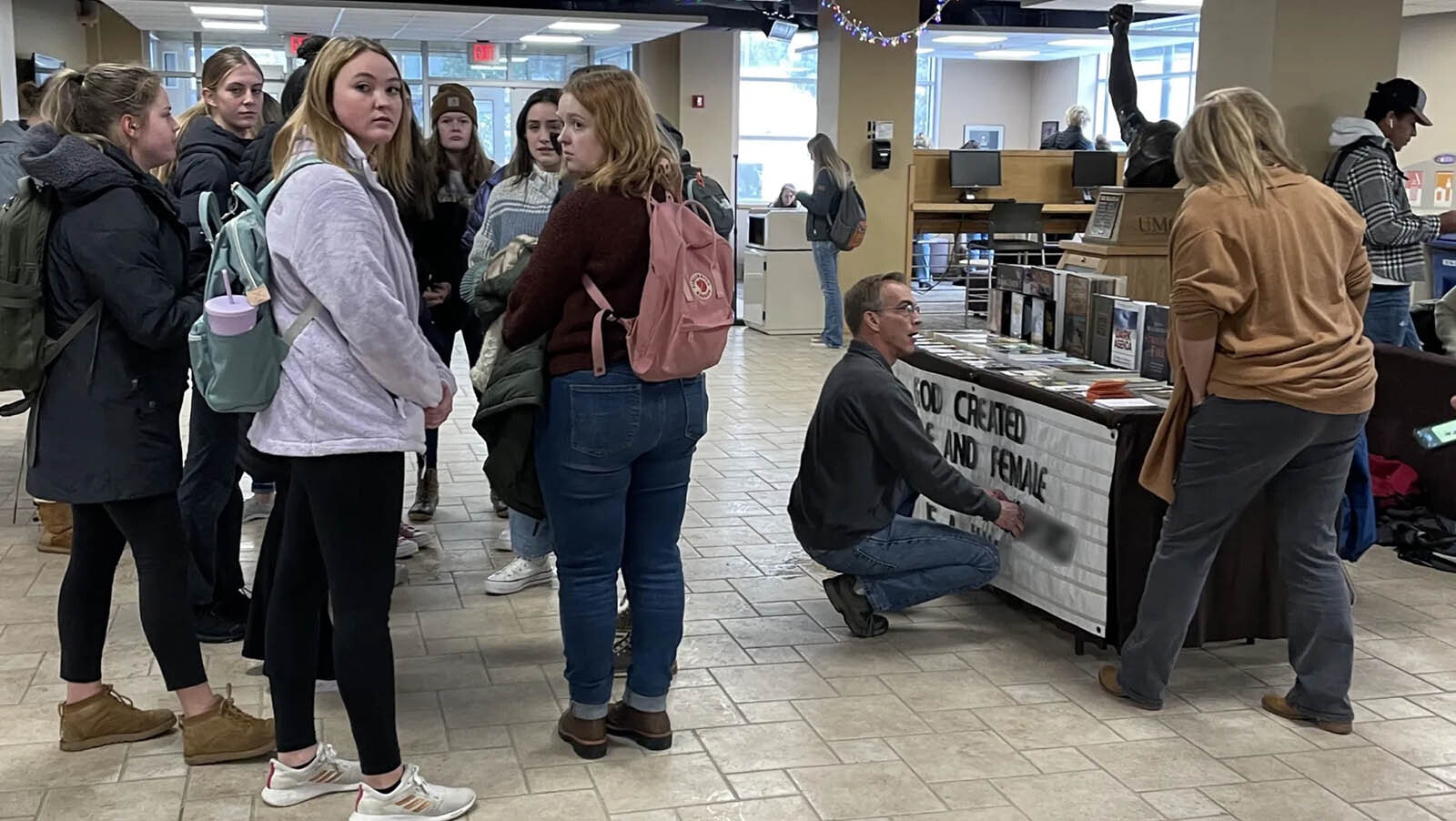A federal judge Friday temporarily blocked University of Wyoming leaders from censoring a Laramie church elder who lost presentation privileges at the college for a year for calling out a specific transgender student as “a male.”
University of Wyoming President Ed Seidel and Dean of Students Ryan O’Neil cannot enforce a yearlong table ban on church elder Todd Schmidt, and cannot censor Schmidt’s viewpoint on campus at the UW Student Union, Nancy Freudenthal, U.S. Senior District Court judge, ruled in a Friday preliminary injunction order.
The order blocks UW's censorship and its ban on Schmidt having a table at the Student Union throughout the case, or until a future order reverses it.
From his regularly-reserved table in the student Union on Dec. 2, 2022, Schmidt displayed a sign that said, “God created male and female and Artemis Langford is a male.”
Artemis Langford is the first transgender inductee into the Wyoming chapter of the Kappa Kappa Gamma sorority.
Students converged to hide Schmidt’s sign by standing in front of it and to debate with him.
O’Neil made Schmidt cover Langford’s name on the sign, saying she would call police otherwise, according to court documents.
Days later, after many UW alumni authored a letter demanding the university take harsher action, the university suspended Schmidt’s tabling privileges until the spring 2024 semester.
University Will Comply
Though UW is disappointed with the judge’s ruling, it will comply with the injunction while considering whether to continue fighting Schmidt's lawsuit, the university wrote in a Friday statement.
“The university believed its one-year suspension of plaintiff Todd Schmidt’s ability to reserve a table in the Wyoming Union breezeway was appropriate and lawful, especially considering his prior misconduct and the university’s legal obligations,” reads the statement.
Schmidt and the university officials have on ongoing dispute in the case on whether Schmidt had broken Student Union rules repeatedly before the Dec. 2 incident.
“Providing a forum for free expression and the airing of diverse views is a foundational principle for UW,” the statement continues. “However, the university must also prioritize protection of its students from unlawful harassment and discrimination. That was the guiding principle in the university’s response to (Todd) Schmidt.”
But Schmidt’s sign was protected speech, not discrimination and harassment, Freudenthal’s order says.
Still, the university said it's grateful she recognized its right to regulate other conduct that is harassing or discriminatory.
“And the university will continue to take lawful steps to protect the safety of students, employees and members of the public,” the statement says.

Unpopular Speech
One reason Freudenthal enjoined the officials’ actions was that the Student Union is a limited public forum, where the government is not allowed to censor people based on their viewpoints.
“Viewpoint discrimination is heavily disfavored, regardless of forum,” wrote Freudenthal, adding a quote from earlier case law: “Viewpoint discrimination is ‘an egregious form of content discrimination. The government must abstain from regulating speech when the specific motivating ideology or the opinion or perspective of the speaker is the rationale for the restriction.’”
Freudenthal characterized the UW officials’ actions as viewpoint discrimination in part because UW didn’t censor other speakers on the same grounds. For example, she wrote, there’s no indication that college officials censored students from arguing with Schmidt about Langford’s sex and using Langford’s name while doing so.
“Therefore, the University appears to be favoring one viewpoint over another,” Freudenthal wrote.
Likely To Succeed
Freudenthal concluded that Schmidt has a likelihood of winning his free-speech lawsuit against UW on the merits of his case. That's one of the tenets she had to show to issue the injunction, and it was the main criterion for this type of case.
There are other tenets judges have to satisfy when issuing preliminary injunctions. Those include:
- A likely threat that the person asking for the injunction will be harmed if the judge doesn’t block the offending action.
- The alleged harm outweighs harm to the party that isn’t asking for the injunction.
- The injunction is in the public interest.
But with First Amendment speech cases, the law tilts toward a presumption that those latter tenets are already met, wrote Freudenthal. The right to free speech is so fundamental that judges expect that lawsuit parties and the public are harmed by its deprivation, the case law indicates.
That’s Not Harassment
After Schmidt filed his lawsuit June 15, UW defended its actions, saying Schmidt’s speech wasn’t protected because it constituted discrimination and harassment against Langford. Allowing Schmidt to hang signs like that could have jeopardized the school’s access to federal funding and violated the school’s policies, the university argued.
Freudenthal disagreed.
Speech is harassment, prior case law dictates, if it is so severe or pervasive that it alters the victim’s work or school conditions and creates a hostile environment. Judges look at the severity of the speech, any physical threats couched within it, its potential to humiliate the victim and interfere with his or her work performance.
The Sixth Circuit Court of Appeals, Freudenthal noted, vacated an earlier federal district court ruling that had equated a professor’s misgendering of a transgender person to harassment.
The professor’s “mode of address(ing)” the student advanced his viewpoint on “a hotly contested matter of public concern,” Freudenthal related from the case. It was therefore protected under the First Amendment.
The professor’s misgendering wasn’t harassment, the Sixth Circuit concluded.
Neither was Schmidt’s, Freudenthal added.
“Schmidt engaged in tense debate with students regarding the propriety of a biological male joining a sorority,” she wrote. “His sign was pure speech and not conduct.”
It is much easier for a college to apply its anti-harassment and anti-discrimination policies to conduct than to speech, Freudenthal added.
Into A Conversation
After Schmidt’s tabling episode, Seidel urged the public to be respectful and to call people “into a conversation” instead of calling them out individually.
Schmidt’s decision to use Langford’s name appeared to be his chief offense, in light of the statement and the ban that followed.
Freudenthal countered, saying even the use of Langford’s name is protected speech.
“The debate revolves around the propriety of a particular biological male participating in an activity — joining a sorority — traditionally reserved for biological females,” wrote the judge. “Schmidt does not misgender Langford to denigrate her, but to debate a public issue.”
The gender debate elevates the public significance of otherwise mundane types of speech like people’s names and pronouns, the order continues. And that public significance also heightens a court’s duty to protect it, Freudenthal added.
“Gender identity … (is a) sensitive political topic and … undoubtedly matter of profound value and concern to the public,” the judge wrote, quoting from earlier case law. “Such speech occupies the highest rung of the hierarch of First Amendment values and merits special protection.”
The involvement of a college campus as a marketplace for ideas increases that vitality even more, she added.
Clair McFarland can be reached at clair@cowboystatedaily.com.





